- Home
- Matt Forbeck
The Con Job Page 10
The Con Job Read online
Page 10
“No harm done.” Patronus grinned. “I’m happy for Jess to think of me as an artist first. That’s my dream. The auction stuff, that’s just a way for me to pay the bills and keep my hand in this industry I love so much.”
Nate mirrored Patronus’s expression. “I like the way you think. I hear that auction of yours might raise a million dollars.”
“At a minimum,” Patronus said. “With some of the high-powered endorsements we’ve lined up here at the show, I’d expect that to go much higher.”
“But don’t you have to pass most of that cash on to the artists?” Sophie said. “I had thought you were selling those things on commission.”
Patronus dismissed that notion with a wave of his hand. “I bought all my inventory direct from the artists or their estates, cash on the nail. Some of them really needed the money, and I didn’t want them to have to wait around to get paid. Setting up an auction like this takes time.”
“What a dirty bastard of a liar,” Hardison said through Nate’s earpiece.
Nate hadn’t realized that Hardison had been listening along. He’d been so quiet up until now. Nate turned to Sophie and nodded in agreement with Hardison’s assessment, though, confident that Patronus couldn’t hear it.
“And he’s also giving a portion of the proceeds to the Hero Initiative,” Sophie said. “He’s a regular philanthropist.”
“Just as long as there’s enough left over in the end,” Nate said as an unfunny joke. Then he sighed. “Trouble is, I really need a commitment on this today. I can’t just blow off all my other meetings for the rest of the week, you see?”
Patronus put up his hands. “I get it. What happens if we get to Sunday and something happens, right? And it all falls through.”
“Right? Not to impugn your intentions at all, of course,” Nate said, “but I’d need some assurances.”
“A handshake’s not good enough?” Sophie said. “It always works for me.”
Nate flashed a wry grin. “You’re an agent, Jess. I’m an attorney. We like paper, and we like it signed. That’s my job, right?”
Sophie gave Patronus a helpless shrug, not bothering to hide her apparent disappointment. “I suppose. I just have more faith in humanity, I suppose.”
“And that’s why you can never be a lawyer.”
Nate folded his hands on the table before him and turned his full attention to Patronus. “Are you serious about this?”
“Yes, I am,” Patronus said without a moment’s hesitation.
Nate could see the man wanted this deal more than just about anything. Not only would it give him the kind of in with a publisher that no editor could ignore, it would also give him a place to stash his ill-gotten gains from the auction. Sure, his marks could try to sue him, but he’d have bought himself an air of respectability that would help deflect the impact of their claims. If he was really lucky—Nate was sure the man thought—the company might actually make back enough money for him to pay everyone off and still leave him in control. And if it failed, he could declare bankruptcy and nullify any judgments against him.
But it was his desire to be a comic-book artist that had caused him to throw caution to the wind. Sophie and the rest of the crew had done such a great job of selling him on his own dream that he’d decided he could ignore the details of the deal, push all his chips into the center of the table, and declare himself all in.
“Good,” Nate said. “I’ll draw up the papers tonight, and I’ll have you sign them tomorrow.”
“Can you bring them by the booth?” Patronus said. “I shouldn’t have been gone this long today. I have to deal with my own whales, and when they can’t talk with me directly, they get nervous.”
Nate sucked at his teeth and tried to come up with some sort of excuse that wouldn’t raise any alarms with Patronus. He didn’t want to go into the convention center. It was crowded and noisy, he knew, and he was sure that by tomorrow it would smell of the funk of a hundred thousand bodies that had been sweating through the first two days in the San Diego sun.
Sophie stopped him cold by putting a hand on his arm, though. She spoke to Patronus, but she kept her eyes on Nate. “Of course he will,” she said.
Nate opened his mouth to rebut that statement, but he hauled up short when he saw the look in Sophie’s eyes. It said, Don’t blow this.
Nate wondered if he should get irritated with her for doing something like that in front of Patronus, something that might give the man pause about taking their bait. Then he realized that Sophie—who was by far the best actress of them all, at least when she was on the job—hadn’t broken character at all. Jess Drew would give Jeff Mace the same kind of look.
Nate swallowed, then looked at Patronus. “Of course,” he said. “When’s good for you?”
“I’m around most of the day tomorrow. How long will it take you to draw up the papers?”
“Not much time at all,” Nate said. “I can crank out one of these in my sleep. I just need to get to my hotel room, tap it all out, and then hope the business center has a decent printer.”
“Oh, I got a printer, all right,” said Hardison, a teasing tone in his voice. “You could have it to him tonight if you wanted to.”
Nate squirmed in his chair. “Yeah, I could get it to you tonight, but I’d rather take the time to get the contract drawn up right.”
“And to give you a bit more time before you got to get your ass into the hall, am I right?” said Hardison. “You really gotta come in here, Nate. This place is fantastic!”
“That sounds perfect,” Patronus said. “Can we shake on it anyhow?”
He stuck out his hand, and Nate took it. “It’s a pleasure doing business with you.”
TWENTY-FIVE
“So how’s this supposed to work again?” Parker said when they were all back in the Field’s upstairs dining room that evening.
Nate had called them all together to make sure they had the plan down. He knew that Hardison and Eliot would disappear for the evening soon, and Parker would wander off and do whatever Parker did in the evenings—maybe climb around the tallest buildings in town for fun. That meant he and Sophie might have an evening alone together, something he was looking forward to. With all five of them sleeping in the same room, there had been damn little privacy for any of them, and he meant to enjoy it, even if only for a little while.
“It’s simple, Parker,” Nate said. “I draw up a contract giving us ownership of all of the artwork or the proceeds from selling it as Patronus’s collateral in our new publishing venture. He signs it, and we’re good to go.”
“And there isn’t anything more to it than that? We don’t have to break into anything or hit anyone?”
Nate shrugged. “Not this time.”
“Huh,” Parker said, nonplussed. “Where’s the fun in that?”
“Come on,” Hardison said. “You already got to break into the convention center once, right? No need to be greedy.”
Parker grinned. “Oh, yeah. That was fun.”
“I’m just fine with something being simple and going right for once,” Eliot said. He slouched down farther in his overstuffed chair to show just how relaxed he was. “It’s nice for a change, isn’t it?”
“You don’t want to hit someone?” Hardison asked.
Eliot gave him a weary smile. “I don’t ever want to hit someone. I hit the right people when they need to be hit. That’s all there is to it.”
“I still don’t get it,” Parker said. She flounced down on the folded-up sofa bed, sitting on it with her legs crossed like a pretzel. “Are we going to just let him sell the artwork and then take the money for it? I thought we came here to get the artwork back.”
“That’s an excellent question,” Sophie said. “The people who gave Patronus their artwork to sell don’t want it back, do they? They want the money for it.”
“Right,” said Nate. “That’s why they gave it to him in the first place. But is he really going to do a good job selling it?”<
br />
Hardison grimaced. “I gotta say, I think so, Nate. He’s got a lot of buzz going on here at the show. Lining himself up with the Hero Initiative was a solid move. Just about every major comic-book creative who’s here this weekend is helping pimp it.”
“I heard he even got Stan Lee to say a few words before the auction begins,” Eliot said.
“I know! How cool is that, and—hey, how do you know who Stan Lee is?”
Eliot shrugged. “Doesn’t everybody?”
“You said you don’t read comics.”
“I don’t.”
“So? How do you know about Stan Lee?”
Eliot winced. “Hey, it’s not like I’ve never read comics. I did, just when I was a kid. Stan Lee was writing them even back then, right?”
Hardison slitted his eyes at Eliot. “Uh-huh. Right. Go ahead and go with that.”
“I’m just saying. They were good too. You know. For something you read as a kid.”
“Comics aren’t just for kids anymore.”
“So you keep telling me.”
“Have you seen the people at this show?”
Eliot laughed in a way that implied he’d maybe seen a bit too much of them. “Yeah, I’ve seen them. Don’t tell me you’re going to hold up this place as a microcosm of America now.”
Hardison held up an index finger. “I will grant you, if you’re only looking at the older—say, overthirty crowd—yes, most of the people here are white men, but not all.”
Nate scoffed at that in disbelief. “Are you really calling thirty old?”
Hardison ignored him. “However, if you look at the younger crowd, you’ll find there’s a lot more diversity in that cohort.”
Sophie almost choked. “Did you just use the word ‘cohort’?”
“What?” Hardison pretended to be offended. “It’s not like I don’t read. I got a word-of-the-day app on my phone. Is it all right I try to sound a little more educated?”
Nate knew that Hardison hadn’t gone to college. In fact, he’d barely finished high school, and only then because his nana had begged him to. It seemed that the young man sometimes regretted skipping college, not because he needed to learn anything a school could teach him, but because he saw it as something that would have earned him instant respect.
Hardison was as smart and sharp a person as Nate had ever met. He was curious and inquisitive and had taught himself just about everything he knew. He didn’t need school for any reason, and certainly not for anything he could have learned there. Despite his lack of higher education, he’d long ago earned the respect of everyone in the room.
“That’s perfectly fine, Hardison,” Nate said. “I think your point is that people of any kind can enjoy comics—and do, if looking around this place is any indication.”
Hardison slapped his hands together in agreement. “Exactly!” he said. “There’s room for everyone at Comic-Con. It’s downright egalitarian.”
“Assuming you can afford to go,” said Parker. “And get a badge in time. And a hotel room.”
“Um, right,” Hardison said, not sure if she was agreeing with him or not. “Assuming all that.”
“All right,” said Nate. “I’m going to draw up that contract tonight, and I’ll have it ready for Patronus tomorrow. Assuming it all goes well, he’ll hand over the money from the auction by tomorrow night.”
“You know, it’s too bad we don’t have a real comic-book company,” Hardison said. “I have some great ideas for a few new series we could publish.”
Nate shot him a look of disbelief.
“Hey, it would be fun. That’s all I’m saying.”
“Fun?” Eliot said. “Sinking thousands of dollars into a book to have it sell a few thousand copies, just enough that you think maybe people want more but not enough for Diamond Comics Distributors to not drop you like a white-hot brick. And seeing as how they’re a virtual monopoly in the industry, that being it for you, no other shot, good-bye. That sound like fun to you?”
All eyes in the room turned toward Eliot. “I thought you didn’t read comics,” Sophie said.
Eliot looked uncomfortable. “It happened to a friend of mine. Had a lot of talent, but the industry chewed him up and spit him out.”
“Right,” Nate said. “Anyhow, I think that about does it for now. Go out, have some fun, do your thing, whatever the hell that is, and we’ll be ready to get this done in the morning. Then we can beat the rush out of here and get back to Boston.”
“Hey, we’re already here,” Hardison said. “We got badges. I’m staying!”
TWENTY-SIX
After dinner, Nate let Sophie talk him into taking a pedicab out to the Seaport Village shopping center north of the convention center. As their cyclist pedaled them along, Hardison passed them by in another pedicab, heading back toward the convention center itself.
“I told him I’d give him another twenty bucks if he’d beat you back to the hall,” Hardison’s voice said in Nate’s earpiece. “Wanna make him work for his money?”
Nate reached out to tap his cyclist on the shoulder and offer him a hundred dollars to blow past Hardison’s pedicab, but Sophie stopped him before he could do so. “Do you really want to get involved in that?” she said in a soft voice.
Nate opened his mouth to say yes, yes he did, but when he looked into Sophie’s eyes, he realized it wasn’t true. Not today, at least. “I suppose not,” he said as he leaned back farther in the pedicab and put his arm around her shoulders.
A moment later, another pedicab came zipping past, the driver standing up on his pedals, his legs pumping as hard as if he had Lance Armstrong on his tail. Eliot stood tall in the cab, balancing in it like a Roman charioteer in a race, shouting encouragement at his cyclist. He caught up with Hardison’s pedicab within half a block and blasted past it.
“Eat my dust!” Eliot said as he goaded his cyclist faster.
“Hey!” Hardison said in protest. “I wasn’t talking to you!”
Despite that, Nate saw him take a bill out of his pocket and stuff it in his cyclist’s back pocket. “And there’s another hundred in it for you if you beat him!” Hardison said to the pedaler.
The pair of cyclists sped off through the Gaslamp Quarter at top speed, jockeying for position as they raced down Fifth Avenue. When Eliot’s cyclist spotted a traffic jam up ahead, right under the wrought-iron gateway that arched over the entrance to the quarter, he swung his pedicab into a sharp right on K Street and disappeared around the corner.
“Where the hell you going?” asked Hardison. Without waiting for an answer, he pointed his pedicab off to the right too, and the cyclist chased after Eliot and his pedaler.
“Only two ways across the light rail between here and the convention center,” Eliot said. “The one on Fifth Avenue’s clogged. Next closest one’s at First.”
“Now how do you know that?” Hardison sounded offended.
“I don’t just look at maps, like you. I’ve been out getting the lay of the land. Right now it’s laid out before me like a racetrack, and there’s nothing between me and the finish line but open pavement.”
“Isn’t there an afterburner on this thing?” Hardison asked his pedaler. “Some kind of nitrous? How ’bout I buy you a Red Bull?”
Eliot snickered to himself the whole way. Nate couldn’t help but join in.
Sophie reached up and turned Nate’s face toward hers with a gentle hand. “Are you enjoying yourself?” she asked with a warm smile.
Nate considered this for a moment. “Yes,” he said. “Yes, I am. We don’t often get a chance to relax during one of these operations. Especially not in such a beautiful place. It’s a nice change of pace.”
Sophie removed her earpiece and gestured for Nate to do the same. He did so, then accepted hers as she held it out for him and slipped them into his shirt’s breast pocket.
“I thought perhaps we could have a little privacy for the evening,” she said, snuggling closer. He squeezed his arm around her sho
ulders and enjoyed the feeling of her head resting on his chest.
“I don’t mind that a bit.”
She looked up at him. “You do realize, of course, that you’re going to have to go into the convention center tomorrow to deliver those papers to Patronus? The whole plan falls apart if you can’t manage it.”
Nate drew in a deep breath and let it out with a long sigh. “I can do it,” he said. “I think.”
Sophie sat up a little bit so she could look straight into Nate’s eyes. “What’s the problem?” she said. “I’ve seen you enter rooms full of armed men. This is just a hall full of pop culture fans. They’re harmless.”
Nate grimaced. “It’s not the people in the hall that bother me. Well, not all of them. Some of the folks in their costumes set me on edge too, I suppose.”
“Have you been in the hall to see them?”
He gestured with his finger at the whole of the Gaslamp Quarter. “I don’t much have to, do I?”
Sophie craned up her neck a bit and spotted a pair of men in long brown coats escorting a woman dressed in a short skirt, leather bustier, high boots, and goggles up the street. A teenage girl wearing a costume that she recognized as Wonder Woman trotted along behind them.
Sophie laughed. “You seem to be managing just fine out here,” she said. “So what’s the issue, then?”
Nate stiffened for a moment. Then he looked into Sophie’s eyes and forced himself to relax. “It’s about Sam,” he said.
“Your son?” Sophie said.
Nate nodded. Sam had been everything to him. He’d been only nine years old when he’d died, and that event had shattered Nate’s world.
Before Sam’s death, Nate had been one of the top insurance investigators in the world, dedicating his life to finding thieves like the ones he was now sharing a hotel room with, and stopping them. The company he worked for, IYS, had refused to pay for the treatment that had been Sam’s only shot at survival. Despite plenty of evidence that it was safe and had a good chance to work, they’d labeled it “experimental” and declared it outside of Nate’s benefits package.

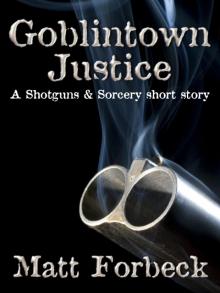 Goblintown Justice
Goblintown Justice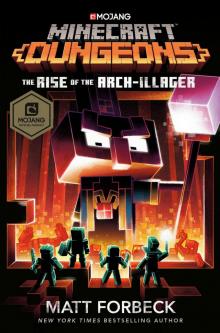 Minecraft Dungeons
Minecraft Dungeons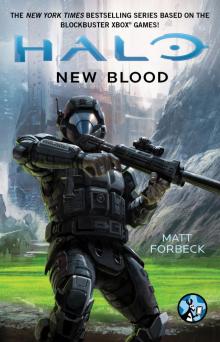 New Blood
New Blood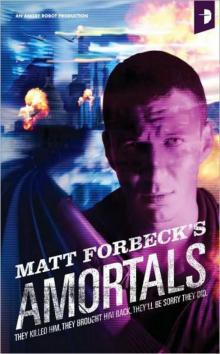 Amortals
Amortals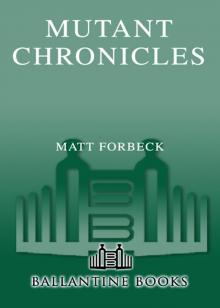 Mutant Chronicles
Mutant Chronicles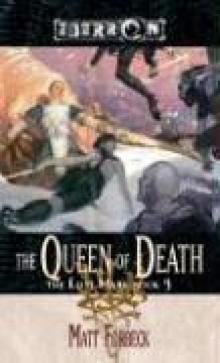 Lost mark 3 The Queen of Death:
Lost mark 3 The Queen of Death: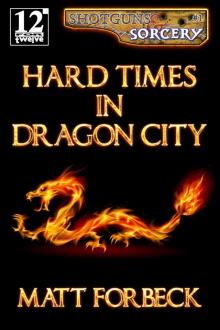 Hard Times in Dragon City
Hard Times in Dragon City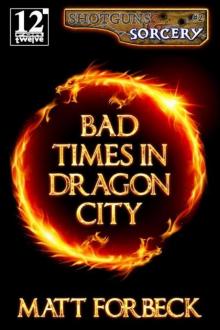 Bad Times in Dragon City
Bad Times in Dragon City Legacy of Onyx
Legacy of Onyx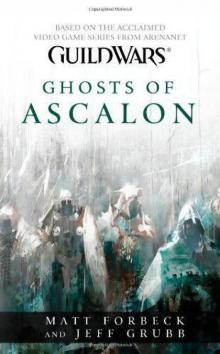 Ghosts of Ascalon (guild wars)
Ghosts of Ascalon (guild wars)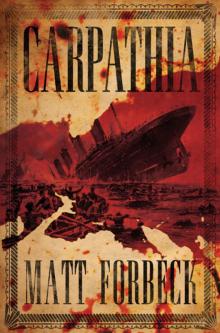 Carpathia
Carpathia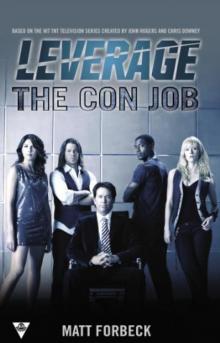 The Con Job
The Con Job End Times in Dragon City
End Times in Dragon City